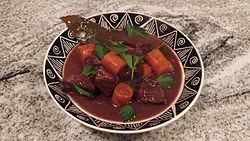 A dish of bœuf bourguignon A dish of bœuf bourguignon | |
| Alternative names | Beef Burgundy, bœuf à la bourguignonne |
|---|---|
| Type | Stew |
| Place of origin | France |
| Region or state | Burgundy |
| Main ingredients | Beef, red wine (often red Burgundy), beef stock, lardons, onions, bouquet garni, pearl onions, mushrooms |

Beef bourguignon (US: /ˌbʊərɡiːnˈjɒ̃/) or bœuf bourguignon (UK: /ˌbɜːf ˈbɔːrɡɪn.jɒ̃/; French: [bœf buʁɡiɲɔ̃]), also called beef Burgundy, and bœuf à la Bourguignonne, is a French beef stew braised in red wine, often red Burgundy, and beef stock, typically flavored with carrots, onions, garlic, and a bouquet garni, and garnished with pearl onions, mushrooms, and bacon. A similar dish using a piece of braised beef with the same garnish is pièce de bœuf à la bourguignonne.
"Bourguignon" is, since the mid-nineteenth century, a culinary term applied to various dishes prepared with wine or with a mushroom and onion garnish. It is probably not a regional recipe from Burgundy.
When made with whole roasts, the meat was often larded.
History
The dish is often "touted as traditional", but it was first documented in 1867, and "does not appear to be very old". Other recipes called "à la Bourguignonne" with similar garnishes were found in the mid-19th century for leg of lamb and for rabbit. In the 19th century, it "did not enjoy a great reputation", perhaps because it was often made with leftover cooked meat.
The dish has become a standard of French cuisine, notably in Parisian bistrots; however, it only began to be considered a Burgundian specialty in the twentieth century.
The co-authors of Mastering the Art of French Cooking, Simone Beck, Louisette Bertholle, and Julia Child, have described the dish as "certainly one of the most delicious beef dishes concocted by man".
Serving
Beef bourguignon is generally accompanied by boiled potatoes, but often also with mashed potatoes or pasta.
Name and spellings
The dish may be called bourguignon or à la bourguignonne in both French and English. It is occasionally called beef/bœuf bourguignonne in American English, but in French and non-American English, by far the most common name is bœuf bourguignon.
See also
- Beef shank – Cut of beef
- Carbonade flamande – Flemish meat and vegetable dishPages displaying short descriptions of redirect targets
- Coq au vin – French style chicken stew
- Daube – French stew of beef braised in wine and garlic
- Hayashi rice – Japanese rice dish
- Oeufs en meurette – French egg dish
- Sauce bourguignonne – French sauce, consisting of red wine, onions or shallots, bouquet garni, and espagnole saucePages displaying wikidata descriptions as a fallback
- List of stews
Notes and references
- Oxford English Dictionary, 3rd edition, 2013 s.v.
- ^ Random House Dictionary online at dictionary.com
- Prosper Montagné, Larousse Gastronomique, English translation, Crown 1961 s.v. 'beef'/ 'beef ragoûts'
- ^ Paul Bocuse, La cuisine du marché, 1980 ISBN 2082000478, p. 182
- ^ La cuisine de Madame Saint-Ange, p. 416
- Auguste Escoffier, "Pièce de bœuf à la bourguignonne", A Guide to Modern Cookery, 1907 p. 379
- ^ Pierre Larousse, Grand dictionnaire universel du XIXe siècle, 2, 1867 s.v.
- ^ A French Lady, "Gigot à la Bourguignonne", Cookery for English Households, 1864, p. 139
- ^ Charles Elmé Francatelli, "Rabbits, à la bourguignonne", The Modern Cook, 1846 p. 320
- ^ Jim Chevallier, A History of the Food of Paris: From Roast Mammoth to Steak Frites, 2018, ISBN 1442272821, p. 191
- Marcel Butler, La bonne cuisine pour tous, Paris, 1885, BnF 301806016, p. 241-2
- ^ Simone Beck, Louisette Bertholle and Julia Child, Mastering the Art of French Cooking 1:315 ISBN 0394721780, 1961
- BBC Food: The Hairy Bikers' beef bourguignon Linked 2023-11-09
- Jamie Oliver: My sumptious beef bourguignon Linked 2023-11-09
- Cafe Delites: Julia Child's beef bourguignon Linked 2023-11-09
- Robert Hamburger, Paris Bistros: A Guide to the Best, 1995, ISBN 0880014172, p. 86
- Wayne Gisslen, Le Cordon Bleu Professional Cooking, Fifth Edition, 2003
- Sharon Tyler Herbst, Food Lover's Companion, Third Edition, 2001
- Usage in Google ngrams